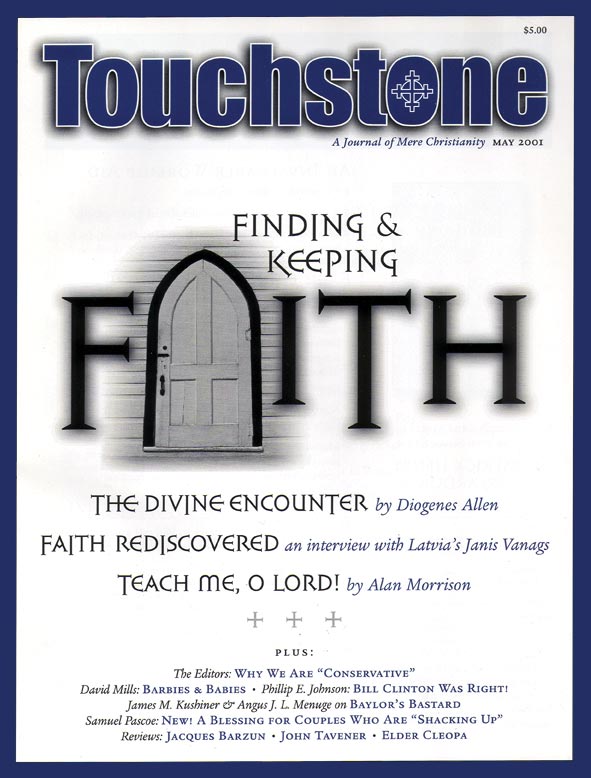Baylor’s Bastard Child
If you only heard about Bill Dembski from his enemies, you would think Baylor University was well rid of him as head of the Michael Polanyi Center, an institution that Baylor invited Dembski to found in 1999. According to faculty opponents, Dembski posed a threat to the science department at Baylor with his ideas about intelligent design. In published stories last year, some even accused him of practicing pseudo-science.
Dembski is a leader in the intelligent design movement and the author of severalgroundbreaking books, including The Design Inference (Cambridge University Press) and Intelligent Design (InterVarsity). (In March, Signs of Intelligence [Brazos Press], an expansion of Touchstone’s 1999 issue on intelligent design, was released, edited by Dembski and me.)
A Front for Creationism?
So why was Dembski fired as director of a center dedicated to intelligent design theory—at a Christian school? Essentially because intelligent design is not considered legitimate science by many in the academic establishment and because Dembski tired of playing the part of second-class citizen expected of him.
Intelligent design is opposed by scientists such as Richard Dawkins and Stephen Jay Gould, who are philosophically committed to Darwinism, essentially a purely naturalistic explanation for everything that exists: the cosmos, life, and everything that makes us human beings. But materialist scientists are not the only ones fiercely fighting Dembski and others. Some Christian scientists committed to Darwinism (such as those at Baylor, a Baptist school) oppose intelligent design as science because they believe it may be too closely associated with “creationism,” and creationism is not welcome in serious academic circles. Creationism, generally speaking, takes as its starting point Genesis 1, a “religious text,” and seeks to conform scientific findings to what is read (often literally, i.e., six 24-hour days) therein.
But Dembski and his intelligent design associates have limited their claims for intelligent design to purely scientific research and data. In April 2000, Dembski organized a conference at Baylor on “The Nature of Nature,” which brought scientists together to debate intelligent design. Did the conference—boycotted by most of the Baylor science faculty—live up to its opponents’ billing as a front for creationism? Hardly. Prominent scientists opposed to intelligent design, including two Nobel laureates, dominated the three-day event. And at the closing dinner of the conference, Christian De Duve, the Nobel laureate from Belgium and one of the world’s leading cell biologists and evolutionists, rose and publicly complimented the scholarly quality of the conference and the civility of the debate. He toasted the organizers of a conference that had been, in his words, “intelligently designed.”
Misbehaving
Despite such affirmations, Dembski was treated as a bastard son of real science. His critics tried to put Dembski in his place, but he didn’t behave himself.
Shortly after the conference, the Baylor faculty voted to ask President Sloan to close the center. Sloan formed a review committee. In October the committee released its report, recommending that Dembski’s work be recognized as legitimate science. They also said that the Faith and Learning Center, under which the Polanyi Center had been operating, should be free to run programs dealing with intelligent design. But they also said the Polanyi name should be dropped, effectively closing the center as it had been established. Further, they moved the new unnamed entity under the umbrella of the Faith and Learning Center, stipulating that Dembski could work there under an advisory board.
Dembski cannily issued a public memo expressing his appreciation for the vindication of his work on intelligent design, and his determination to carry on his research “unabated” under a reorganized center as approved by the committee. Then he went on to say that the opponents of intelligent design had “met their Waterloo.” He closed by commending Baylor “for remaining strong in the face of intolerant assaults on freedom of thought and expression.”
This was too much for Dembski’s opponents and a firestorm of protest broke out on campus. Dembski was asked by Sloan to retract his celebratory memo. Unwilling to do this, he was removed from the directorship for “uncollegial” behavior. (For a fuller account and analysis of this story, see Angus J. L. Menuge’s “Few Signs of Intelligence” in this issue, pp. 54–55.)
James M. Kushiner is the Director of Publications for The Fellowship of St. James and the former Executive Editor of Touchstone.
subscription options
Order
Print/Online Subscription

Get six issues (one year) of Touchstone PLUS full online access including pdf downloads for only $39.95. That's only $3.34 per month!
Order
Online Only
Subscription

Get a one-year full-access subscription to the Touchstone online archives for only $19.95. That's only $1.66 per month!
bulk subscriptions
Order Touchstone subscriptions in bulk and save $10 per sub! Each subscription includes 6 issues of Touchstone plus full online access to touchstonemag.com—including archives, videos, and pdf downloads of recent issues for only $29.95 each! Great for churches or study groups.
Transactions will be processed on a secure server.
more from the online archives
calling all readers
Please Donate
"There are magazines worth reading but few worth saving . . . Touchstone is just such a magazine."
—Alice von Hildebrand
"Here we do not concede one square millimeter of territory to falsehood, folly, contemporary sentimentality, or fashion. We speak the truth, and let God be our judge. . . . Touchstone is the one committedly Christian conservative journal."
—Anthony Esolen, Touchstone senior editor









